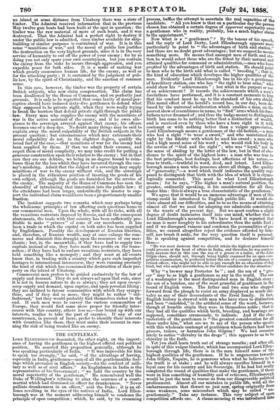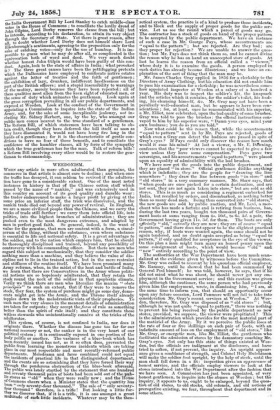THE GENTLEMAN.
LORD ELLENBOROUGII descanted, the other night, on the import- ance of having the gentleman in the highest official and political position. He asserted this proposition generally, although he was speaking particularly of India. " It was impossible for him to speak too strongly," he said, " of the advantage of having, especially in India, gentlemen—men of all the gentlemanlike feel- ings which prevailed in English society—for the conduct of mili- tary as well as of civil affairs." An Englishman in India is the representative of his Government ; " we hold the country by the moral superiority of the gentleman." He remembered well the Duke of Wellington's refusing to alter the sentence of a court- martial which had dismissed an officer for drunkenness. " Never palliate drunkenness in an officer," said the Duke ; it is an of- fence revolting in the eyes of the natives of India. Lord Ellen- borough was at the moment addressing himself to condemn the principle of open competition ; which, he said, by its cramming process, baffles the attempt to ascertain the real capacities of the candidate. " All you know is that on a particular day the person chosen has obtained a certain degree of apparent superiority over a gentleman who in reality, probably, hag a much higher claim to the appointment." Now what is a " gentleman" ? By the tenour of his speed, and the reply of Lord. Derby, Lord Ellenborough appears more particularly to point to " the advantages of birth and station," and those are no doubt great advantages; but we suspect he means something more. He means that amongst men of birth and sta- tion he would select those who are the fittest by their natural and attained qualities for command or administration,—men who have profited by the advantages of birth and station. He should point to men who to the birth add what is called " breeding " ; that is the kind of education which developes the higher qualities of the man. Evidently Lord Ellenborough has in his eye a gentleman of hereditary station, one who has the right to bear arms," who could show his " achievements " ; but what is the purport or use of an achievement? It records the achievements which a man's forefathers have performed, and it is a constant memento to him that his conduct must be up to the standard of his own shield. This moral effect of the herald's record has, in our day, been de- based by the universal adulteration which enables a man, on the poorest show of resemblance in name, to "find" arms which his fore- fathers never dreamed of ; and thus the badge meant to distinguish birth has come to be nothing better thata distinction of wealth, and is received even by those who have a born right to it with contempt or with nothing better than a vulgar appreciation. Lord Ellenborough means a gentleman of the old fashion,—a man who had a right " to wear a sword," and who maintained his right by the fidelity with which he used his sword ; a man who had a high moral sense of his word ; who would risk his body in the service of "God and the right " • who was "loyal," not in the sense of abiding by the letter of the law, but in that of obe- dience to the spirit of the highest laws ; a man who was true to the best principles, best feelings, best affections of his nature,— true to truth,—truthful in word, deed, and intent. Lord Ellen- borough means a man who possesses above all things, the quality of " generosity,"—a word which itself indicates the quality sup- posed to distinguish that birth with the idea of which it is etymo- logically connected. This must be what Lord Ellenborough means ; for he says, " The higher a man's natural position, the greater, ordinarily speaking, is his consideration for all those under him : this is always a true characteristic of the gentleman."
We agree that it would be an immense advantage if men of this stamp could be introduced to English public life. It would ob- viate almost all our difficulties, and be to us the means of attaining almost all that we need for adapting our admirable constitution to the wants of the present day. But we must confess a slight degree of doubt insinuates itself into our mind, whether that is Lord Ellenborough's meaning. We have heard it reported that no man is more haughty to his subordinates than the noble Earl ; and if we disregard rumour and condemn the personalities of po- litics, we cannot altogether reject the evidence afforded by him- self, nor brush it aside, for the very question itself is personal. He is speaking against competition, and he declares himself thus- " He was most desirous that we should retain the highest gentlemen we could procure at the head of affairs in India, and therefore he was partiou larly anxious that in this case the son of a grocer or a tailor, of the John Gilpin class, should not, through being highly crammed for an open com- petitive examination,. be preferred before the son of a country gentleman or retired officer, who might not be able to pay enough for an education of that kind, but who might nevertheless, be the fittest candidate for the situation."
Why " a brewer may Protector be " ; and the son of a " gro- cer" may be as high a gentleman as any in the world. The son of a woolstapler is the most distinguished man in English story ; the son of a butcher, one of the most graceful of gentlemen in the round of English verse. The father and two sons who stepped forward from the plough to resist an army displayed as much chi- valry as any of their descendants of the Errol family. In fact, English history is strewed with men who have risen to distinction and been " ennobled," in the artificial sense of the word, because, though of humble origin they were in themselves noble ; that is they had all the qualities which birth, breeding, and bearings are supposed, sometimes erroneously, to indicate. And if the cha- racteristic of the gentleman is " the greatest consideration for all those under him," what are we to say of the person who speaks with this wholesale contempt of gentlemen whose fathers had been grocers, tailors, or harmless John Gil ins ? We had occasion lately to notice "chivalry in the dregs "; this appears to us to be chivalry in the froth. Yet you shall learn truth out of strange mouths ; and after alf, in spite of this vulgar blunder, which has accompanied Lord Ellen- borough through life, there is in the man himself some of the highest qualities of the gentleman. If he is ungenerous towards John Gilpin, Esquire, he is generous when what he believes to be the truth is at stake ; and he will always sacrifice himself in a loyal care for his country and his Sovereign. If he had but really completed the round of qualities that make the gentleman, if there were in him something of humility and of reticence, Ellenborough_ would be just the man to rescue us from our disagreeable political. predicament. Almost all our mistakes in public life, with all the embarrassments that thwart us just now, spring originally, from some weakness, some misconduct which may be called gentlemanly." Take any instance. This very subject of open competition affords one. A clause securing it was introduced into the India Government Bill by Lord Stanley to catch middle-class votes in the House of Commons ; to concihate the lordly dread of John Gilpins, Lord Derby removes the clause from the bill ; but he intends, according to his declaration, to attain its very object through the Secretary of State. Yet there is Feat reason, after ail, to doubt whether Lord Derby does not himself share Lord Bllenborough's sentiments, agreeing to the proposition only for the sake of catching votes—only for the use of humbug. It is im- possible to guess what he may do after all, so complicated is the equivocation both of word and deed. We very much doubt whether honest John Gilpin would have been guilty of this con- duct. Again, look to the state of affairs in India : what provoked it? The three great causes have been the pettifogging pretexts which the Dalhousies have employed to confiscate native estates against the letter of treaties and the faith of gentlemen ; the exhibition of lazy, drunken, indifferent heedlessness on the part of the British officers ; and a stupid insensibility to warnings of the mutiny, merely, because they have been repeated ; all of them qualities most alien from the keen sight of educated men, or the sense of duty which animates the gentleman. Look again at the gross corruption prevailing in all our public departments, and exposed at Weedon. Look at the conduct of the Government in appointing a Commission to inquire into the state of the Indian Army, and, for the sake of some inexplicable jealousy, not in- cluding Mr. Sidney Herbert, one, by the by, who amongst our public men comes nearest to the-true standard of a gentleman. The Reform Bill, of which statesmen have been talking to ob- tain credit, though they have deferred the bill itself as soon as they have discounted it, would not have hung fire long in the hands of a gentleman ; for it is the characteristic of gentle con- ditions to have no fear of those beneath, and to conciliate the confidence of the humbler classes, all by force of the sympathy which the true gentleman has for the man. Talk of reform bills ! a Reform Bill involving every other would be to restore the gen- tleman to statesmanship.



























 Previous page
Previous page